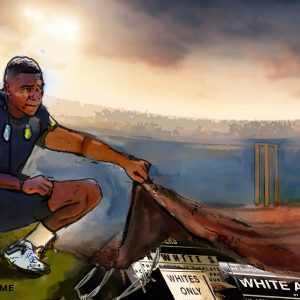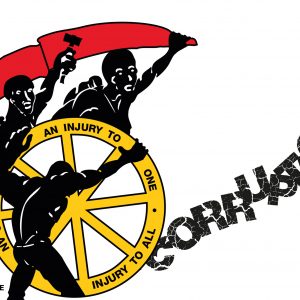Sports activism’s struggle with hypocrisy
Emboldened by social protests, athletes are speaking out about issues, even refusing to play. But their actions are often at odds with those of the brands and sports associations they represent.
Author:
14 September 2020

Nike offered Colin Kaepernick a lifeline at a time when he had sacrificed his professional American football career to make a stand for black lives in the United States. He became the focal point of the sports apparel company’s new advertising campaign as the 2018 National Football League (NFL) season approached, his face appearing alongside the words “Believe in something. Even if it means sacrificing everything”.
And Kaepernick had sacrificed everything. Blackballed from the sport for refusing to stand for the national anthem in protest against police killings of black people, he became a martyr for socially conscious athletes and sports fans.
But the ad campaign was divisive. Videos soon emerged of angry Americans – mostly white, some wearing red Make America Great Again caps – cutting up and burning their Nike gear. Others publicly declared their disdain for the NFL. President Donald Trump scattered derision across Twitter.
Related article:
Not that Nike shareholders cared. Despite an initial hit, the company’s market price rose to $6 billion – a 5% bump – less than a month after the launch of the ad. Supporters of Kaepernick and the Black Lives Matter movement showed their allegiance by purchasing $160 React Element 87 sneakers and $150 football jerseys with “Kaepernick” printed on the back.
How much money went Kaepernick’s way remains undisclosed. Whatever the figure, it bolstered his previous deal with Nike – worth $22 million while an active player – and has ensured that he can commit fully to activism, most notably with his Know Your Rights camp that empowers disadvantaged youths. The NFL might have barred him from the stage on which he made his name, but Nike helped elevate him to an echelon few athletes reach.
A deal with the devil to do good
Since Kaepernick teamed up with Nike, law enforcement officers have killed more than 1 000 Americans. Some died in altercations with the police. Others, such as George Floyd, whose death in May sparked global protests, were unarmed and defenceless.
So it is worth asking what the ad campaign achieved beyond raising the profile of Kaepernick and the revenue stream of a multibillion-dollar company. Did this union serve as a catalyst for a new era of athlete activism?
“If anything, it’s actually set back the broader cause of justice,” says Jim Keady, a former US college soccer coach turned social activist. In 1998, Keady began researching Nike’s global labour practices from St John’s University, where he also worked as a goalkeeper coach. Around this time, a deal worth $3.5 million was signed between the athletics programme and Nike. Keady refused to endorse the brand, was given an ultimatum and resigned from his post.
He then spent a month living among Nike sweatshop workers in an Indonesian shack settlement. Like his neighbours, he survived on $1.25 a day, losing 10kg as a result. When he returned home, he dedicated his life to social justice and published the 2011 award-winning documentary Behind the Swoosh.
Related article:
“If Nike wanted to, they could fix things,” Keady says, providing an estimated figure of $300 million needed to give factory workers around the world a dignified life. “It’s a company with over £30 billion in profits. Instead, they set up a task team of 120 people that cost $30 million to convince people that everything was fine.”
Keady’s activism has increased awareness but the problem persists. According to a report published in The Washington Post newspaper in February, ethnic minority Uighurs were being forced to produce Nike shoes in appalling conditions in Western China. Nike responded by saying it would review its suppliers’ hiring practices.
“Nike is a perfect case study of everything that is wrong with the world today,” says Keady. “They are the perfect example for imperialism and neoliberal capitalism. That is why the disconnect between Kaepernick’s outstanding work on racial and class inequality and the Nike deal is a challenge.”
Mixed messages
By endorsing Kaepernick but dragging its feet on the plight of its workers half a world away, Nike is effectively sending out the message that only some black lives matter. Those in the US who can extract money from the woke by tugging on their consciences matter. Those who toil in anonymity, stitching countless ticks on kicks for scant reward, do not.
This is not the only hypocrisy of which Nike is guilty. For years, the company terminated its contracts with female athletes if they became pregnant. In 1990, British long-distance runner Liz McColgan-Nuttall was an Olympic silver medalist with most of her career ahead of her at the age of 25, when Nike dropped her the moment she told the company she was pregnant.
Last year, two of Nike’s biggest assets – sprinter Allyson Felix and distance runner Alysia Montaño – told The New York Times newspaper how Nike effectively gave them a choice between motherhood and a lucrative contract.
“The sports industry allows for men to have a full career, and when a woman decides to have a baby it pushes women out at their prime,” Montaño said, breaking a non-disclosure agreement with Nike. “Companies like Nike tell us to dream crazy. We say, how about you stop treating our pregnancies like injuries.”
podcast:
Like Montaño, Felix called for greater protection of female athletes, especially from sponsors who use their image to sell products. “[Nike] have used me in a lot of their stores and a lot of their campaigns,” she said. “But I’m also a mother. I want to see change.” Felix left Nike and signed with Athleta – a B Corporation company oriented towards women – in July last year. In August, Nike buckled amid criticism and amended its policy.
There is little doubt that the company has played an integral role in championing Muslim women athletes by introducing activewear hijabs, and their Dream Crazier campaign highlighted superstar sportswomen such as Serena Williams and Caster Semenya. But it is telling that when athletes stand up to the corporate behemoth, they are easily swatted aside.
Nike has always styled itself as a brand for the countercultural but still expects its athletes to toe the party line. Writing in 2018, journalist Dave Zirin observed: “Nike has used the image of rebellion to sell its gear, while stripping that rebellion of all its content.”
But has it? Is Kaepernick’s message concerning police brutality somehow diluted because he is in bed with Nike? Not according to Peter Hain, the former British member of Parliament who at 19 years of age became the chairperson of the Stop the Seventies Tour campaign that disrupted sports events involving apartheid South Africa.
‘Social justice was not on the agenda’
In 1969, Hain led protests calling on the United Kingdom government to bar the South African cricket team from competing in the country. This came a year after the corresponding tour to South Africa was scrapped when Basil D’Oliveira, the South Africa-born English allrounder was denied entry to the country of his birth because of his skin tone.
“One could feel cynical about Nike, but the truth is no major company was in support of what we were doing,” Hain says. “It would never have occurred to them. Social justice was not on their agenda. You can question Nike’s motives and business practices, but the fact is this should be seen as a major advance.”
Hain speaks of the isolation he felt at times when standing up to powerful regimes. “It was us against the system,” he says. “Racism was much more overt then. The Ku Klux Klan was marching in America. We had fascist groups in Britain directly opposing us. Apartheid was in full force. Racism was a major problem in the police. There was no legislation or safeguards combating systemic racism.”
As a result, athletes who lifted their heads above the parapet did not do so with an army at their back. Tommie Smith and John Carlos were turned into pariahs for raising their fists in the black power salute at the 1968 Olympic Games in Mexico City. When Hain and his allies were protesting, there was scant support from notable athletes in the UK.
“Apart from England cricket captain Mike Brearley and the Welsh and British and Irish Lions flanker John Taylor, there was no one,” Hain says. “It was a different environment then. Sportspeople did not have the same platform they have now. Even if they did, very few saw it as their business to get involved in politics.”
Today there are scores of influential athletes fighting on multiple fronts against injustice. Many of them are black athletes in the US and UK, such as Raheem Sterling, Naomi Osaka, LeBron James and Lewis Hamilton. In South Africa, cricket and rugby are undergoing important cultural recalibration because two prominent black players – Lungisani Ngidi and Siya Kolisi – have called openly for change.
Related article:
The power athletes hold has never been greater. Now, no longer content with simply espousing an ethos from a privileged position, some are refusing to take part in the distraction altogether.
A wave of basketball, baseball, soccer and hockey matches in the US had to be cancelled when players effectively went on strike after yet another police shooting of an unarmed black person. Less than 48 hours after Jacob Blake was shot seven times in the back in Kenosha, Wisconsin, former world No. 1 tennis player and 2018 US Open champion Osaka encapsulated this important moment.
“Before I am an athlete, I am a black woman,” she said in a tweet explaining why she was withdrawing from her scheduled semifinal match in the Western & Southern Open in August. “And as a black woman I feel there are much more important matters at hand that need immediate attention, rather than watching me play tennis.”
She did not say that tennis, or any other sport, does not matter. What she said was that while her country burns as a result of a raging culture war, and while unarmed black people are indiscriminately shot by police officers, she will not play an active role in turning heads away from difficult truths.
Double standards by leagues and associations
Athletes have raised their fists and gone down on one knee, but these gestures have not achieved their intended purpose. By leaving courts and fields empty, athletes are able to challenge billionaire team owners with a direct line to mayors, senators and presidents. These are powerful people who have contributed to the politics of today. These athletes are acting as cattle prods not only to the rest of society but also to these wealthy owners.
This in itself is a long shot as leagues, like sponsors, are rife with hypocrisy and blind spots. In November, Daryl Morey, general manager of the Houston Rockets, tweeted his support for pro-democracy protesters in Hong Kong with the message “Fight for Freedom. Stand with Hong Kong”.
But the National Basketball Association (NBA) has a long and strong relationship with China, where major games attract more viewers than in the US. The Rockets are one of the more popular teams in China, having made Yao Ming their first pick in the 2002 draft. Some ties are stronger than others. As state news anchor Kang Hui put it, “Chinese Rockets fans are first Chinese. We love Chinese red more than Rockets red. Morey, this time you really fouled. If you foul, you have to pay the price.”
What followed was an international scandal. A 30-year television deal with CCTV and a $500 million partnership with a technology conglomerate was at stake. Morey apologised unreservedly. The NBA stressed its “great respect” for China.
podcast:
This embarrassing episode proved that the league, which has styled itself as a champion for human rights in the US, will kowtow to a dictatorship if it threatens to turn off the money tap. No matter how many players call for domestic change on courts adorned with Black Lives Matter banners, this truth is inescapable.
The coronavirus has taught us that sport can exist without fans. It cannot exist without players. Striking US athletes have again changed the landscape of athlete activism. As with undulating sand dunes, it is impossible to know how the set will look at the next scene.
Whatever transpires, sport unquestionably has crossed the Rubicon. If they organise a game and no one plays, the entire industry collapses. The sports industry has to respond to this reckoning in a way it did not have to when Hain was campaigning.
The companies who funnel fortunes towards athletes, and the leagues that supply platforms for their talents, are now faced with the distinct decision of being on the right or wrong side of history. This is no easy task. The ever-changing landscape of athlete activism means it is all but impossible to stand on solid ground.





